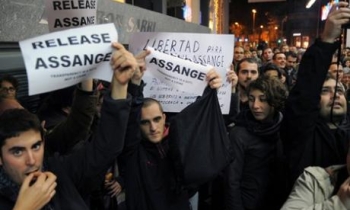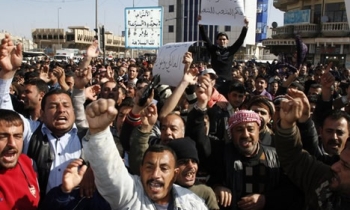Ignored or shunned by almost every cable TV provider in the U.S., the Al Jazeera English news channel has turned to the Internet to reach American viewers.
Since April, when Al Jazeera struck a distribution deal with YouTube, the popular video site owned by Google Inc., the channel has received 2 million hits and on one day last month was ranked first, ahead of Paris Hilton and other staple fare.
Described by Donald H. Rumsfeld, the former Defense secretary, as a "mouthpiece of Al Qaeda," the Arabic channel's English-language offspring was given a hostile reception in the U.S. when it started broadcasting in November.
Only two cable providers, Buckeye CableSystem, which reaches 147,000 homes in northern Ohio, and a small municipal service in Burlington, Vt., that is piped to just 1,000 homes, have so far agreed to offer it to their subscribers.
Al Jazeera, which is based in Qatar, is also available on the Pentagon's closed-circuit television system for troops and officials. But the main cable providers, such as Time Warner and Comcast Corp., have avoided it.
"America is fighting a war and Al Jazeera works for the enemy," says Cliff Kinkaid, the president of Accuracy in Media, a conservative watchdog that has campaigned against the channel. "Would Buckeye CableSystems have broadcast Tokyo Rose [an anti-American propagandist] during World War II? I don't see any difference."
Allan Block, the owner of Buckeye, dismisses such criticism as "lunatic ranting." He also points out that he voted for George W. Bush in 2000. "I have received threats and abuse, mostly from people living in the Bible Belt and almost none of them from Ohio," Block says.
"They claim I'm carrying a terrorist channel which broadcasts beheadings. But anyone who has watched Al Jazeera realizes it's a balanced and professional channel that gives people diverse perspectives on international events. And it doesn't show beheadings."
The channel, which reaches 90 million homes worldwide -- fewer than 1% of them in the United States -- has shown savvy in the journalists it has hired, including former employees of ABC, CNN and the BBC. David Marash, a former correspondent at ABC who is one of Al Jazeera's three U.S.-based anchors, says it helps that people recognize him.
"Frequently, people will call the police when we're out there doing reporting in America," he says. "The police come 'round, they recognize me and that quickly solves the situation," he says.
Equally effective is the presence of Josh Rushing, Al Jazeera's U.S. defense and military correspondent, who used to be a captain in the Marines.
Rushing's previous job was as a spokesman at the U.S. military's Central Command in Doha, the capital of Qatar and headquarters for the invasion of Iraq. Rushing grew frustrated with what he described as Centcom's disdain toward Al Jazeera and the fact that the Pentagon would not listen to his argument that it provided a unique, new way for America to reach the "Arab street."
He resigned from the Marines and was offered a job at the new channel. "I used to represent America to Al Jazeera, now I represent Al Jazeera to America," Rushing says. "I tell people that Al Jazeera provides a different perspective to CNN but an equally valid one. CNN films the launch of the missile. Al Jazeera films what happens where it lands."
With the help of YouTube and Al Jazeera's global website, which gets more than half of its traffic from the U.S. (the channel's four main bureaus are in Doha, London, Washington and Kuala Lumpur, Malaysia), some barriers are starting to break down.
"Elected politicians and senior officials still refuse to be interviewed by us," Marash says. "But people from the think tanks, including some well-known neoconservatives, are very happy to come on Al Jazeera. They appreciate the fact that we go into much more detail than CNN."
The channel's leaders hope that U.S. cable providers will eventually be forced by popular demand to include it in their service, much like what MTV achieved with its "I Want My MTV" campaign in the 1980s. But the channel might face an even bigger obstacle than hyped-up fears about terrorism: the public's lack of interest in international news.
Marash is unfazed. "I think the line about the 'brave little channel they wouldn't let you see' appeals to something in the American spirit," he says. "I am optimistic that we will succeed in America."









